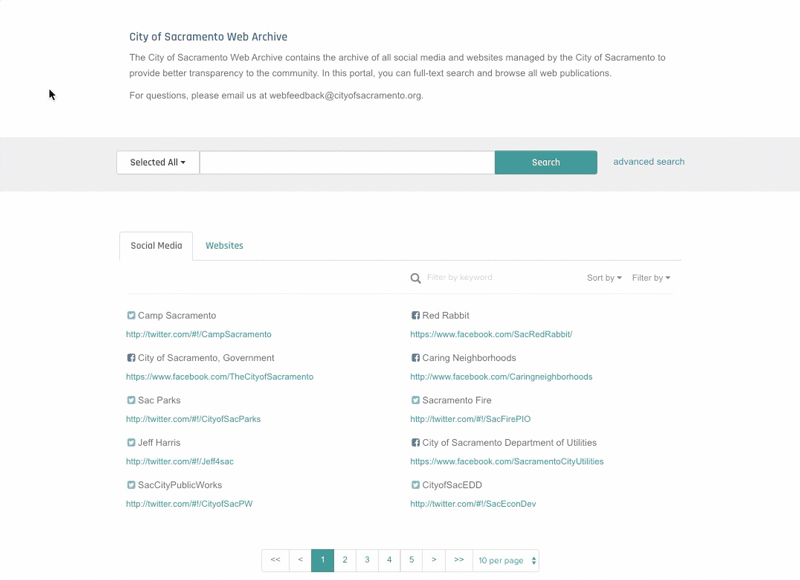Open Records Compliance
and Response
Meet Recordkeeping Requirements.
Respond to Open Records Requests.
The Challenge
Responding to FOIA/Open Records Requests.
Public-sector organizations need to be able to respond to FOIA/Open Records requests related to website, social media, enterprise collaboration, and mobile text content. This requires accurate recordkeeping of online channels.
The Solution
Automated, real-time archiving of online data.
By capturing and preserving online data in real-time, organizations can easily respond to records requests related to this information.
“The best thing about the Pagefreezer solution is that we know that we are as compliant with the law as possible…without requiring our staff to do any extra work in capturing and managing the archived data.”

Capturing Online Data in Real-Time
Collect and preserve online communications, including deleted comments/conversations.

Responding to Records Requests
Quickly find and deliver requested information related to your online data.

Increasing Openness and Transparency
Make official online communications easily accessible to citizens.
White Paper: The Government Guidebook to Electronic Records Management for FOIA & Open Records Compliance
Website and social media archiving can significantly assist with compliance by collecting and retaining complete and accurate records of online activity. This guidebook has been put together to get you familiar with the concept of digital archiving, and inform you of some important considerations when choosing how to backup your government data.
More information by region:

Capturing Online Data in Real-Time
Public-sector organizations often find their online channels—such as official Facebook pages—becoming public forums for conversation and debate. This makes it both crucial and challenging to capture all these real-time ongoing conversations. This content is dynamic, not only are citizens constantly replying and adding to the conversation, but comments are also being deleted. Agencies are regularly forced to delete comments because of profanity, threats of violence, and other inappropriate behavior and users themselves choose to delete their comments. Open Records laws require that these comments be captured, preserved, and made available upon request, but how exactly can agencies archive this data?
Pagefreezer can capture all of your website, social media, enterprise collaboration, and mobile text content. In the case of social media and enterprise collaboration, this includes conversations like DMs in Twitter and Private Messages in Facebook. These captures ensure compliance with regulations and enable Pagefreezer archives to be used in the eDiscovery process. As long as the messages are under the same account, they can be archived and are in full Open Records compliance.

Responding to Records Requests
Public record laws state the kinds of information that must be delivered upon request and outline the required disclosure procedures and formats. Key recordkeeping requirements for compliance include collecting website and social media metadata, preserving content in original file formats, and retaining materials for at least 7 years.
Complying with these laws can cost governments thousands a year, at an average of $678 per information request. A report from Washington State’s Auditors Office revealed that state and local governments spent $60 million to fill more than 285,000 public-records requests during a recent 12-month period.
Website & social media archiving can save dramatically on public records costs, making information available in the right formats, so it is easy to deliver if requested by any citizen, business or organization.

Increasing Openness and Transparency
Being able to respond to open records requests is a major reason why organizations should be keeping detailed records of online data, but public sector agencies also have a responsibility to act as openly and transparently as possible. When it comes to online data like social media content, this means making all records—including edits to posts and deleted comments—freely available to the public.
Pagefreezer has developed a Public Portal specifically to meet transparency needs. A Public Portal makes the Open Records compliance process as easy as possible—share online data with your constituents on-demand, 24/7. Citizens can access records, perform keyword searches, and download content in PDF format.
“The best thing about the Pagefreezer solution is that we know that we are as compliant with the law as possible. We are able to meet the expectations of our City policy without requiring our staff to do any extra work in capturing and managing the archived data. The ease of use is also a plus for our transparency initiative where we continue our commitment to 24/7 access to as much data as practicable.”
— Dawn Bullwinkel
Assistant City Clerk/Special Projects, The City of Sacramento
Case Study
City of Sacramento: Fulfilling Government Transparency Through a Public Portal
See How Pagefreezer Assists Specific Industries
Learn how Pagefreezer can help you comply with FOIA/Open Records regulations.
Get in touch with us to learn more and see Pagefreezer’s solutions in action.
Have more questions?
Contact us at +1-888-916-3999 or sales@pagefreezer.com
1-888-916-3999
support@pagefreezer.com
Head Office:
#500-311 Water Street
Vancouver, BC V6B 1B8
Canada
Europe Office:
Van Leeuwenhoekpark 1 - Office 5
2611 DW, Delft
The Netherlands
UK Office:
+44 20 3744 7173
Australia Office:
+61 (07) 3186 2199














